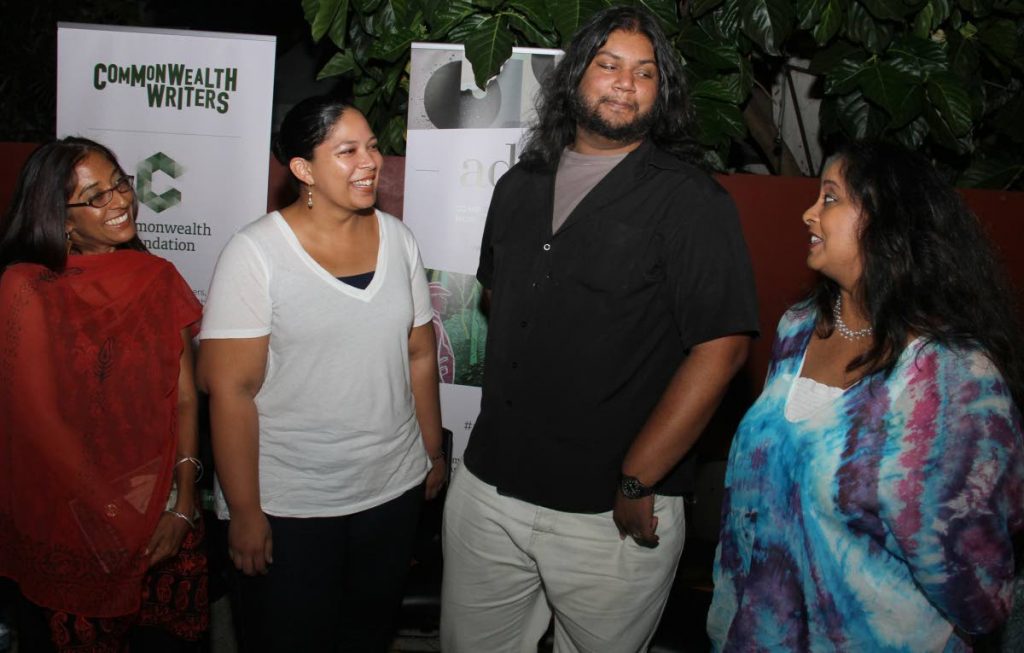Tell your stories, now

MANY people especially the elderly have stories to tell of their lives that can fill in the gaps in textbook accounts of the history of TT, was the message coming out of the launch of the 2019 NGC Bocas Lit Fest at the Writers Centre, St Clair, on Wednesday night.
Janet Steel, of the body Commonwealth Writers, hosted four local writers who had contributed to an anthology of East Indian writings, We Mark Your Memory: Writing From the Descendants of Indenture.
These writers were Dr Gabrielle Hosein, Patty-Ann Ali, Stella Chong Sing and Kevin Jared Hosein, the latter the winner of the 2018 Commonwealth Short Story Prize.
As if to open the doors for all voices to be heard, Gabrielle Hosein made the point that indentureship had not been a single experience, even as afterwards East Indians had ventured out to other Caribbean islands from Trinidad. “So there is no single indentureship experience.”
Kevin Jared Hosein said he had got ideas that contributed to his work in the anthology from local historian, the late Angelo Bissessarsingh.
Chong Sing recalled the gap left in her understanding by the limited fare offered by school history textbooks. “Textbooks could get you only so far. They outline events in chronological order. But we need personal stories, feelings, experiences, that are left out of textbooks.
“This weekend, start talking about your family history, writing things down!”
Ali, daughter of broadcaster the late Ian “Uncle Ian” Ali, said she was greatly influenced by stories from an old aunt, from research/reading and her imagination.
“My great aunt lived with us, a living archive of stories of Indians in TT.” She said many East Indian families in TT were extended families that likewise included elderly relatives.
Ali firmly agreed with Chong Sing that accounts given by living people of their lives and times do more than textbooks to help us understand the past.

Gabrielle Hosein recalled a period when she had explored her Indian background, lightly relating she had even ended up as Miss Mastana Bahar 2000.
She was glad about a feminist documenting of the history of indentureship.
In contrast to a common belief that women had migrated from India to TT merely to become wives of male indentured labourers, Gabrielle Hosein said they migrated in their own right as workers. She said those women had negotiated their own economic and sexual autonomy long before the emergence of British feminism.
Steel, whose roots are in the UK and South Africa, reckoned that TT rated quite favourably as a destination for East Indians, compared to other parts of the world. She said that the descendants of people who had similarly left India but had ended up in Malaysia and Sri Lanka today are deprived of their rights.
“Thousands of Indians work in Malaysia in cane fields and do not have citizenship. In Sri Lanka, Indians don’t have the vote. The story is quite different here in the Caribbean. Is integration in TT as beautiful as it seems?”
Steel later told Newsday that in apartheid South Africa her very own parents had not been allowed to marry due to being of different races, one East Indian and the other European.
In their readings, Ali read a quite traumatic tale of child marriage in old India, even more traumatically followed by suttee or the burning of the same female as a living bride on a pyre with her dead husband. However, in the third verse the spirit of the dead woman rose and ended up in Trinidad, joyfully in a happy place.
Gabrielle Hosein continued the celebratory theme in her own poem about dancing to local rhythms, Chutney Love.
The festival’s new chairman Rani Lakhan-Narace told Newsday how happy she was with the ever growing event. She said in addition to its artistic aspect, the festival could also create economic benefits in an era of the mantra of diversification.
The evening also featured two mesmerising tunes, one a Sufi song, played by Sharda Patesar on the sitar guitar and Kieran Sankar on the tabla drum.


Comments
"Tell your stories, now"